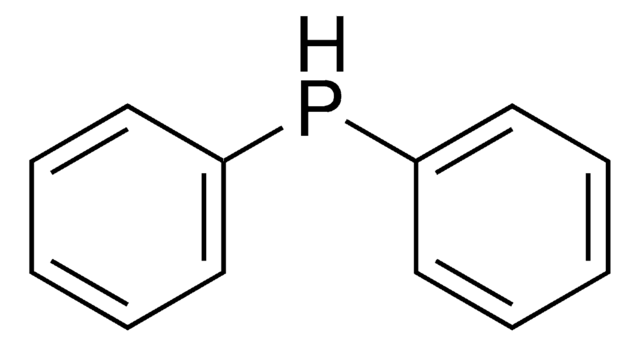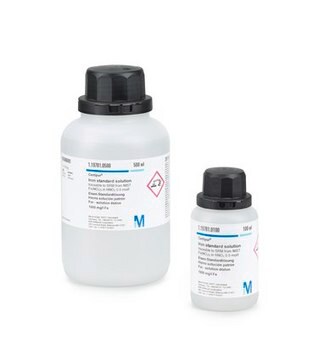484385
Gold(III) chloride solution
99.99% trace metals basis, 30 wt. % in dilute HCl
Synonym(s):
Auric chloride, Gold trichloride
About This Item
Recommended Products
grade
for analytical purposes
Quality Level
Assay
99.99% trace metals basis
form
liquid
composition
Au, 17 wt. %
concentration
30 wt. % in dilute HCl
impurities
≤150.0 ppm Trace Metal Analysis
density
1.637 g/mL at 25 °C
SMILES string
[H][Au](Cl)(Cl)(Cl)Cl
InChI
1S/Au.4ClH/h;4*1H/q+3;;;;/p-3
InChI key
VDLSFRRYNGEBEJ-UHFFFAOYSA-K
Related Categories
General description
Application
- As a starting material to prepare thiolate-stabilized gold nanoparticles.
- As an efficient catalyst for single-pot oxidative functionalization of alkanes and alcohols.
- As a catalyst for diastereoselective alkylation reactions with chiral benzylic acetates.
Signal Word
Danger
Hazard Statements
Precautionary Statements
Hazard Classifications
Acute Tox. 4 Oral - Aquatic Chronic 2 - Eye Dam. 1 - Met. Corr. 1 - Skin Corr. 1B - STOT RE 2 Oral
Target Organs
Kidney
Storage Class Code
8B - Non-combustible corrosive hazardous materials
WGK
WGK 3
Flash Point(F)
Not applicable
Flash Point(C)
Not applicable
Choose from one of the most recent versions:
Already Own This Product?
Find documentation for the products that you have recently purchased in the Document Library.
Customers Also Viewed
Articles
Single molecule electronics is the endeavour of constructing electronic circuitry with single molecules as the fundamental building block.
Noble-metal nanostructures are widely used in a variety of applications ranging from catalysis to electronics, surface plasmon resonance (SPR), surface-enhanced Raman scattering (SERS), and biomedical research.
Plasmonic nanoparticles have unique optical properties that can be tailored to suit a variety of applications in the biotechnology1–8 and electronics9–16 industries.
Global Trade Item Number
| SKU | GTIN |
|---|---|
| 484385-10G | 4061838253910 |
| 484385-50G | 4061832390611 |
Our team of scientists has experience in all areas of research including Life Science, Material Science, Chemical Synthesis, Chromatography, Analytical and many others.
Contact Technical Service










